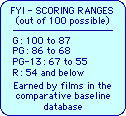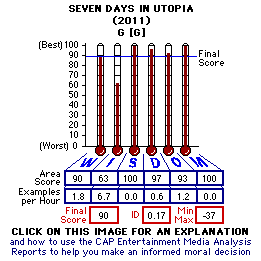RED does not mean "stop." GREEN does not mean "go." Click on the CAPCon Alert image for explanation |
A ministry of the ChildCare Action Project: Christian Analysis of American Culture (CAP Ministry) A 501(c)(3) Nonprofit Christian Ministry. www.capalert.com/ Entertainment Media Analysis Report A service to His little ones through you in His name by His Word MAR2011.120  (2011), G [G*] (1hr 39min) The #1 Christian entertainment media analysis service on the Internet. We give you OBJECTIVE tools NO ONE ELSE CAN to help YOU make an informed decision for yourself whether a film is fit for your family. Over 1300 analyses for parents, grandparents, pastors, youth leaders and more. |
 |
(a PayPal account is NOT required). The CAP is a 501(c)(3) nonprofit Christian ministry. Donations are TAX-DEDUCTIBLE. |
on what Hollywood feeds your kids. SUBSCRIBE (or unsubscribe) to our FREE email version of these reports and our COMING SOON notices. |
Christian Long Distance |

(While the Scriptural references are certainly not subjective, my commentary may be and sometimes is somewhat subjective.)
 Cast/Crew Details Courtesy Internet Movie Database Production (US): Prospect Park, Utopia Pictures Distribution (US): Visio Entertainment Director(s): Matt Russell Producer(s): Ele Bardha, Jason Michael Berman, Rob Carliner, Kwesi Collisson, David Cook, Ken Herfurth, Lindsay Hovel, W. Michael Jenson, Susan Kirr, Susan Kirr, Mark G. Mathis, Phil Myers, Mick Partridge, Jess Stainbrook Screenplay by: Rob Levine, Matt Russell, Sandra Thrift Novel Golf's Sacred Journey: Seven Days at the Links of Utopia: David Cook Cinematography/Camera: M. David Mullen Music: Klaus Badelt Film Editing: Robert Komatsu Casting: Lindsay Graham, Mary Vernieu Production Design: Maxwell Fasen, Clark Hunter Art Direction: Helen Harwell, Poldo Ramirez Viewed at Rave Motion Pictures theater, Fort Worth, TX  The unknown golf contender, Luke Chisolm (Lucas Black) has been groomed since adolescence to become a golf great by his father Martin (Joseph Lyle Taylor) but due to an attitudinal meltdown at losing his first pro debut, Luke tries to escape the pressure of his highly public display of tantrums to somewhere ... anywhere ... and ends up nowhere in a pile of twisted steel that once was his car. Now stranded in Utopia, Texas and after regaining composure and getting himself up from the car wreck, Luke finds himself looking up at Texas rancher Johnny Crawford (Robert Duvall). After nursing his injuries, Luke finds Johnny to be deeply profound about life and with ways that can change his life ... and the direction it is headed. After a seven-day Crawford boot camp of re-grooming and reprogramming everything about himself, Luke is invited to play the Valero Texas Open against the leading pro golf master. Johnny, who as it turns out is a former PGA Tour professional himself, dispenses volumes of wisdom to Luke who resists Johnny at first as a bungling but kindly old cowboy who means well but could not possibly understand but Luke eventually realizes the value of what Johnny is teaching him. And why. Now that the Crawford boot camp is over, Luke stands on the green of the last hole of the Valero Texas Open against TK Oh. Luke has just sent the ball on its way to the cup in the final stroke of the final hole that, if successful, will change his life. If the ball lands in the cup it will make him the PGA champ. But at the last second of the ball's trip to the cup the camera pans off to the sky. Did Luke make that potentially life-changing shot? We will never know. But does it really matter? It would have been great if Luke had made that last shot and won the Valero but if he had missed the shot would he have really lost? If he lost, what would he have lost? That which Luke "won"in the seven days in Utopia was of so much greater value than the fleeting glory of winning a golf game. One of the most thought-provoking, knock-you-into-next-week, head-grabbing wake-up calls Johnny uses is SFT. I will leave what SFT means to your discovery should you decide to watch this film. Following are brief discussions of the content per individual CAP investigation area. As always the Findings section of this report is the best source for discovering the full accounting of the content of this film. Wanton Violence/Crime (W) - 90 out of 100 The only matters of violence/crime in the entire 99 minutes of the program is the car wreck and the reckless driving. Impudence/Hate (I) - 63 out of 100 Here is where the "spike" of content appears. There are two uses of profanity. [Col. 3:8, Eph. 4:29] Luke's attitudinal meltdown involved a series of tantrums. [Isa. 13:11] In addition, Luke shows disrespect toward his father due to friction between the two which leads to a heated argument. [Exod. 20:12] Sexual Immorality (S) - 100 out of 100 There is nothing to even approach sexually immoral behavior or display in the entire film. Drugs/Alcohol (D) - 97 out of 100 One of Luke's acquaintances spoke "More drinks for me tonight." That is all. Offense to God (O) - 93 out of 100 God's name is abused once and then without the four letter expletive. [Deut. 5:11] But using His name in vain without the four letter expletive is still using His name in vain. Luke and his friends are seen gambling once. Murder/Suicide (M) - 100 out of 100 There were no murders or suicides found. SCRIPTURAL APPLICATION(S) If needed to focus or fortify, applicable text is underlined or bracketed [ ] or bold. If you wish to have full context available, the Blue Letter Bible is a convenient source. If you use the Blue Letter Bible, a new window will open. Close it to return here or use "Window" in your browser's menu bar to alternate between the CAP page and the Blue Letter Bible page. CHAPTER/VERSE As always, it is best to refer to the Findings/Scoring section -- the heart of the CAP analysis model -- for the most complete assessment possible of this movie. |
(The objective heart of the CAP Analysis Model, independent of and insulated from the Summary / Commentary section.)  Wanton Violence/Crime (W) - 90 out of 100 Impudence/Hate (I) - 63 out of 100 Sexual Immorality (S) - 100 out of 100 Drugs/Alcohol (D) - 97 out of 100 Offense to God (O) - 93 out of 100 Murder/Suicide (M) - 100 out of 100 |
| There are some in the entertainment industry who maintain that 1) violent programming is harmless because no studies exist that prove a connection between violent entertainment and aggressive behavior in children, and 2) young people know that television, movies, and video games are simply fantasy. Unfortunately, they are wrong on both accounts." And "Viewing violence may lead to real life violence." I applaud these associations for fortifying 1 Cor. 15:33. Read the rest of the story. From our years of study, I contend that other aberrant behaviors, attitudes, and expressions can be inserted in place of "violence" in that statement. Our Director - Child Psychology Support, a licensed psychologist and certified school psychologist concurs. For example, "Viewing arrogance against fair authority may lead to your kids defying you in real life." Or "Viewing sex may lead to sex in real life." Likewise and especially with impudence, hate and foul language. I further contend that any positive behavior can be inserted in place of "violence" with the same chance or likelihood of being a behavior template for the observer; of being incorporated into the behavior mechanics and/or coping skills of the observer. In choosing your entertainment, please consider carefully the "rest of the story" and our findings. |
|
Thank you for visiting us and may God bless you. Prayerfully, we will provide you with some of the most revealing commentary and investigative reporting you have ever read. In the name of Jesus: Lord, Master, Teacher, Savior, God. Tom Carder Chaplain and President ChildCare Action Project (CAP): Christian Analysis of American Culture 100% dependent on your tax-deductible financial support |  |
Christian Long Distance |
|
We exist only by your tax-deductible donations. PLEASE Features PayPal! You do NOT need an account to donate. |

| For G rated Films with G equivalence: G PG equivalence: PG-G PG-13 equivalence: 13-G R equivalence: R-G< | For PG rated Films with G equivalence: G-PG PG equivalence: PG PG-13 equivalence: 13-PG R equivalence: R-PG | For PG-13 rated Films with G equivalence: G-13 PG equivalence: PG(13) PG-13 equivalence: PG-13 R equivalence: R-13 | For R rated Films with G equivalence: G-R PG equivalence: PG-R PG-13 equivalence: 13-R R equivalence: R | For NR rated Films with G equivalence: G-NR PG equivalence: PG-NR PG-13 equivalence: 13-NR R equivalence: R-NR |